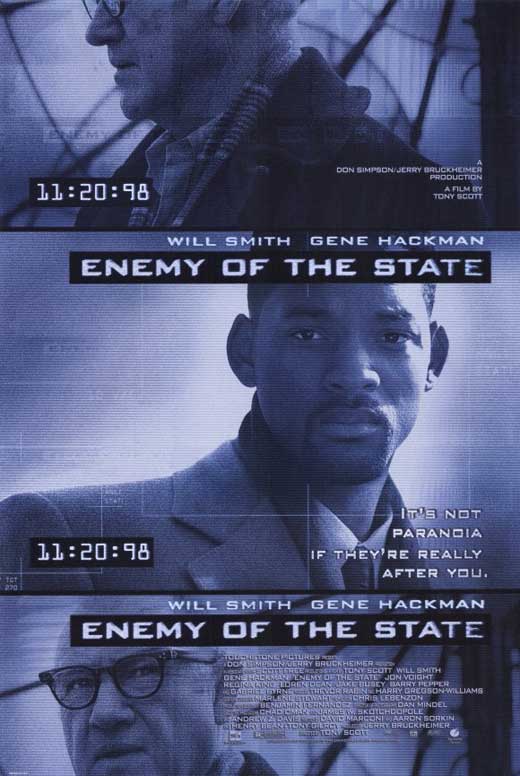

Director: Tony Scott, 1998 (R)
Larry King appears early in this film asking
the question on his TV show, “How do we draw the line between protection of
national security, obviously the government’s need to obtain intelligence data,
and the protection of civil liberties, particularly the sanctity of my home?”
This sets up the ethical question the film is addressing. And in true Hollywood
fashion, the rights of the little guy, the single citizen, become preeminent.
Tony Scott fails to answer to King’s question but gives us an exciting thrill
ride nevertheless.
The prologue sets the scene. An NSA
bureaucrat, Thomas Reynolds (Jon Voight, Mission Impossible), appears talking
to a politician about an upcoming surveillance bill. Not getting the answer he
wants, he resorts to murder, but masks it as suicide. Unknown to him, this is
all caught on digital videotape. When Reynolds finds out, he charters a secret
team to capture the tape at all costs.
After the credits, we meet Robert Dean (Will
Smith, in a dramatic, not comedic role). A labor lawyer who is working for the
unions against the mob, he has it all: a good job, a solid reputation, a
beautiful wife and son, and a handsome home in Georgetown. All this will be
taken from him before the end of act one.
 While shopping for lingerie for his wife, the
cameraman, an old friend, drops the videotape into Dean’s bag while being
chased by Reynold’s thugs, ultimately to his death. Dean knows nothing of this.
But when Reynold’s team cannot find the tape at Deans’s house, they up the
ante: turning off his credit cards, discrediting his reputation which gets him
fired, and implying an affair which gets him kicked out of his home. He is
literally left, at one point, with nothing not even the shirt on his back!
While shopping for lingerie for his wife, the
cameraman, an old friend, drops the videotape into Dean’s bag while being
chased by Reynold’s thugs, ultimately to his death. Dean knows nothing of this.
But when Reynold’s team cannot find the tape at Deans’s house, they up the
ante: turning off his credit cards, discrediting his reputation which gets him
fired, and implying an affair which gets him kicked out of his home. He is
literally left, at one point, with nothing not even the shirt on his back!
When he finds himself in contact with Brill
(Gene Hackman), a reclusive ex-spy who lives in an abandoned warehouse and acts
as a surveillance expert, he finds his naiveté exposed. Conspiracy theory comes
into focus. And with a little help from Brill, he sets out on reclaiming his
life.
Tony Scott, brother of the great Ridley
Scott, is a master of pacing, as he showed in Top Gun, and he brings his A-game
here. The film moves briskly, with very short shots. Scott effectively uses
overhead cameras to let us see how the NSA and other clandestine agencies use
satellite imagery to track people. Enemy of the State conveys a claustrophobic
dystopian feel.
 The film succeeds on a taut script and terrific
chemistry between the two leads. Hackman is really a support to Smith, but he
is excellent in this role. Smith, a good comedian, plays this mostly straight.
He communicates the fears of an everyman taken out of his normal path and
thrust into a nightmare when he truly becomes an enemy of the state.
The film succeeds on a taut script and terrific
chemistry between the two leads. Hackman is really a support to Smith, but he
is excellent in this role. Smith, a good comedian, plays this mostly straight.
He communicates the fears of an everyman taken out of his normal path and
thrust into a nightmare when he truly becomes an enemy of the state.
Hackman has played a role like this before,
as Harry Caul in Francis Ford Coppola’s The Conversation. In fact, a still
image of the younger Brill is taken from Coppola’s film, another surveillance
thriller. There are a number of similarities between these two movies, but I
will save that for its own blog post.
Despite the success of the action sequences,
such as the initial cameraman chase and a later chase, Scott does not linger on
the ethics. He is too caught up in the visuals and the explosions. He leaves
that to the viewer, although most viewers will be here for the action itself.
I’ll explore the ethics of surveillance in
the separate blog just mentioned. But one theme that emerges here is the
omnipresence of surveillance technology. Big Brother is clearly watching, or at
least potentially watching, if the satellites are retargeted accordingly. There is little that we can hide, although
line of sight does prevent everything being seen, a clear plot device when the
tape is being surreptitiously transferred at the start. We might worry about
this.
Yet there is one, much bigger than Big
Brother, who needs no technology to see all. The Lord God sees all that occurs
on this earth. At the very beginning, “The Lord saw how great the wickedness of
the human race had become on the earth, and that every inclination of the
thoughts of the human heart was only evil all the time” (Gen. 6:5-6). God not
only sees action, he knows motivation and inclination. We cannot hide from him.
As Jeremiah’s book says, “ ‘Who can hide in secret places so that I cannot see
them?’ declares the LORD. ‘Do not I fill heaven and earth?’ declares the LORD”
(Jer. 23:24). The great psalmist and king, David, put it this way: “Where can I
go from your Spirit? Where can I flee from your presence?” (Psa. 139:7). This
is no conspiracy; it is spiritual reality.
Copyright ©2012, Martin Baggs

The state has become the enemy of the people.
ReplyDelete